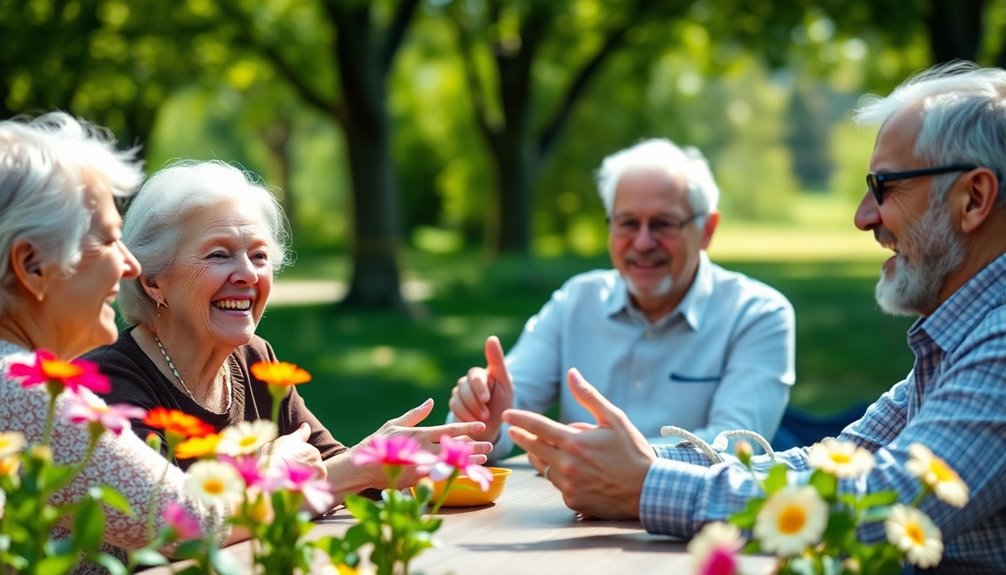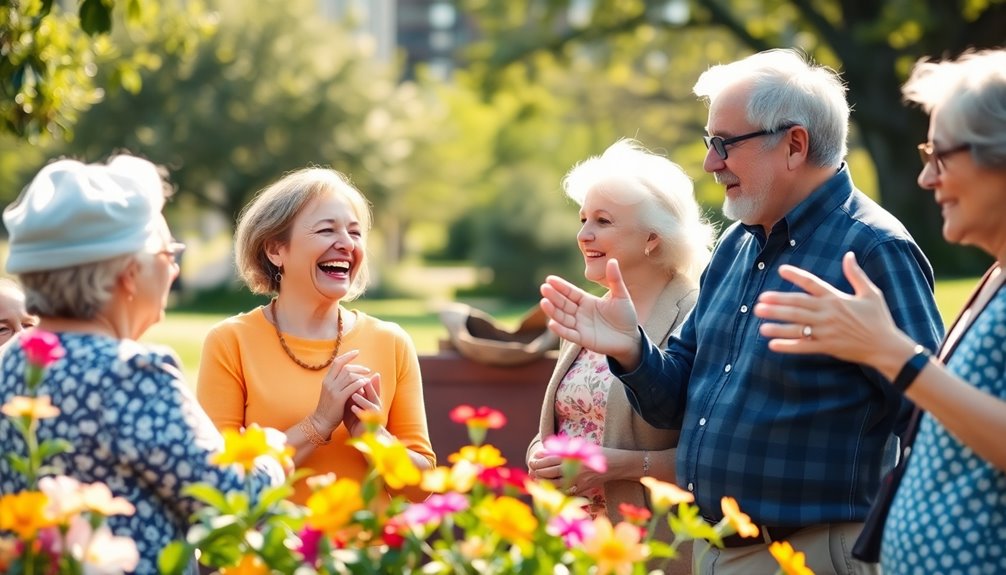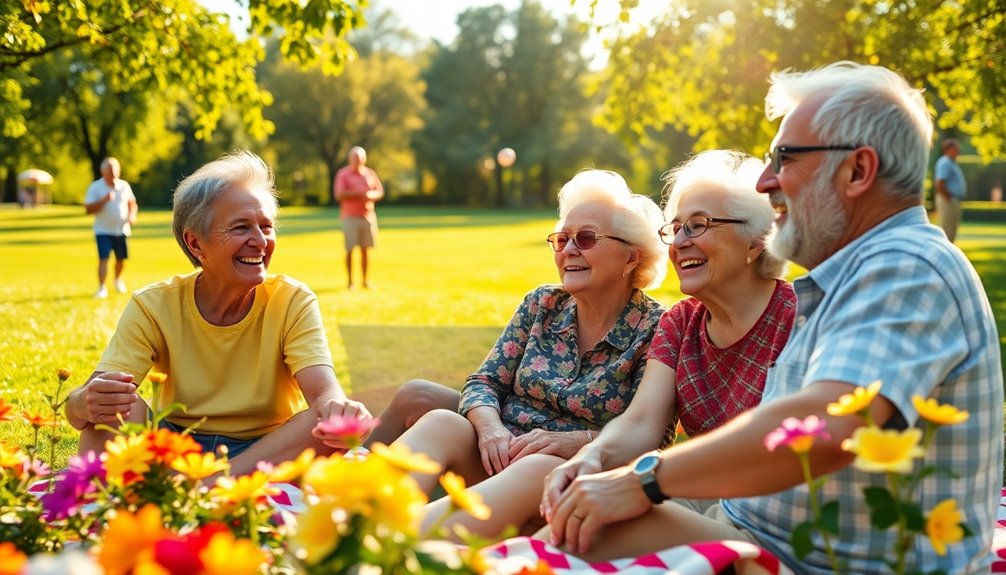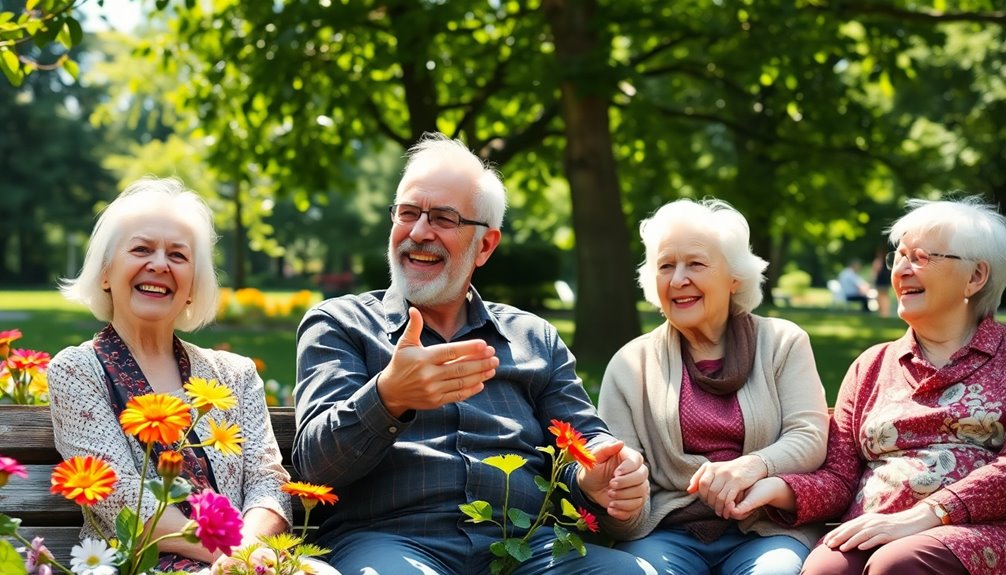Social engagement brings a host of mental health benefits for the elderly. You'll experience enhanced emotional well-being, improved cognitive function, and a greater sense of purpose. Engaging with others reduces feelings of loneliness and boosts your social support network. Plus, you'll enjoy better sleep quality, boosted physical health, and even increased longevity. These connections help strengthen community ties, making life more fulfilling. Keep exploring to uncover even more ways social activities can enrich your life!
Key Takeaways
- Social connections reduce feelings of loneliness, lowering the risk of depression and anxiety in elderly individuals.
- Engaging in group activities stimulates cognitive function, enhancing mental agility and reducing the risk of cognitive decline.
- Active participation in social networks fosters a greater sense of purpose and life satisfaction, improving overall emotional well-being.
- Social engagement improves sleep quality by reducing stress and anxiety, contributing to better physical health and wellness.
- Strong relationships and support networks enhance longevity and reduce the risk of early death among seniors.
Enhanced Emotional Well-being

When you engage in social activities, you not only build connections but also enhance your emotional well-being. Strong social connections help combat feelings of loneliness, offering support that reduces the risk of depression and anxiety. Additionally, participation in social activities can mimic the benefits seen in pet therapy for emotional support. Engaging in these activities can also promote emotional regulation, which is essential for managing emotional responses and improving interpersonal relationships.
By participating in group activities, like clubs or volunteer work, you foster a sense of belonging, which greatly boosts your self-esteem. Shared experiences and laughter during these interactions lower stress levels, leading to greater happiness and life satisfaction.
Research shows that seniors with active social lives experience improved mental health outcomes, reporting higher levels of purpose and satisfaction in life. Additionally, creating transforming spaces can facilitate these social interactions, making it easier for seniors to connect and engage with others.
Improved Cognitive Function

Engaging in social activities not only keeps you connected but also stimulates your brain.
When you participate in group games or discussions, you sharpen your focus and enhance your mental agility.
This active social interaction is key to maintaining and even improving your cognitive function as you age.
Brain Stimulation Activities
Participating in brain-stimulating activities can greatly enhance cognitive function in seniors, making it easier to maintain mental sharpness. Engaging in puzzles, chess, or bridge encourages strategic thinking, boosting mental agility and memory. Additionally, narcissistic abuse can negatively affect mental health, which emphasizes the need for supportive social interactions. Studies have shown that regular screenings can help identify potential health issues, encouraging proactive health management among seniors.
Arts and crafts also play an essential role, improving fine motor skills and overall cognitive abilities. By joining group activities like trivia games or team discussions, you stimulate your brain while promoting social engagement, which is key for fighting cognitive decline. Regularly participating in these mentally demanding activities can lead to better concentration and working memory. Significantly, studies show that consistent cognitive engagement through social interaction can lower the risk of developing dementia and Alzheimer's disease, highlighting the importance of staying mentally active. Additionally, spiritual retreats can provide opportunities for social engagement while enhancing overall mental wellbeing.
Social Interaction Benefits
Social interactions play an essential role in enhancing cognitive function among seniors, as they not only foster connections but also stimulate the brain. Engaging in social activities can greatly improve your cognitive health, boosting concentration and memory.
By participating in group games and creative projects, you can keep your mind agile and delay cognitive decline, reducing the risk of dementia and Alzheimer's disease.
Here are some benefits of social engagement:
- Enhances executive reasoning skills
- Promotes critical thinking through creative activities
- Improves working memory and overall cognitive performance
- Strengthens social connections that boost mental well-being
- Encourages problem-solving and decision-making abilities
Embrace social interactions for improved cognitive function and a healthier mind!
Greater Sense of Purpose

A greater sense of purpose can greatly enhance the lives of seniors, as it fosters feelings of value and connection. Engaging in social interactions through community activities or volunteering not only combats loneliness but also boosts mental health. Here's how social engagement contributes to a robust sense of purpose:
| Benefits of Social Engagement | Impact on Seniors |
|---|---|
| Increased Life Satisfaction | 80% feel a sense of belonging |
| Stronger Emotional Well-being | Enhanced mental health |
| Reduced Feelings of Worthlessness | Less loneliness |
| Greater Sense of Responsibility | essential for longevity |
| Active Social Networks | 50% more likely to feel purposeful |
Building relationships fosters social support, enriching your emotional well-being and ensuring you feel valuable in your community. Additionally, engaging socially can enhance self-discipline and consistency, which are crucial for maintaining a fulfilling life. Furthermore, regular social interactions can lead to increased life satisfaction, ultimately contributing to improved overall happiness and well-being. Engaging with others also allows seniors to develop essential skills that can enhance their interactions in various aspects of life.
Reduced Feelings of Loneliness

Feeling isolated can be tough, but you can combat loneliness by engaging with others. Building strong support networks through social activities not only connects you with friends but also boosts your emotional well-being. Additionally, developing a strong support network can significantly enhance your overall mental health and resilience during challenging times. Engaging in social activities can also help mitigate the emotional stress associated with life changes, such as divorce, which affects over 40% of marriages. Moreover, fostering social connections can promote personal growth and provide a sense of purpose that enhances overall life satisfaction.
Combatting Social Isolation
While many older adults grapple with loneliness, engaging in social connections can greatly alleviate these feelings. By actively participating in community activities, you can enhance your mental health and emotional well-being. Recognizing signs of stagnation in social interactions can also motivate you to seek new connections and experiences. Additionally, forming strong social bonds can significantly improve overall psychological resilience.
When you connect with others, you reduce the risk of isolation and improve your overall life satisfaction. Here are some ways to combat social isolation:
- Join a local club or class
- Volunteer for community service
- Attend social events or gatherings
- Participate in group exercise or wellness programs
- Reach out to friends and family regularly
These social engagements not only foster relationships but also provide emotional support, ultimately leading to a happier, healthier life. Additionally, maintaining high vibrational energy through social interactions can further enhance your overall sense of well-being.
Building Support Networks
Establishing strong support networks is essential for reducing feelings of loneliness among older adults. Nearly 43% of seniors experience loneliness, particularly those living alone, who are more vulnerable to mental health issues.
By engaging in social interactions through support networks, you can greatly lower the risk of depression and anxiety. Community programs offer excellent opportunities to meet others and foster connections, enhancing your emotional well-being.
These strong social connections provide essential emotional support, helping to alleviate feelings of worthlessness and promoting resilience. When you actively participate in these networks, you not only combat loneliness but also improve your overall life satisfaction.
Building these relationships is important for a healthier, happier life as you age.
Increased Social Support

Social support plays an essential role in enhancing the mental well-being of older adults. When you engage socially, you can greatly reduce feelings of loneliness and isolation, which affects nearly 43% of seniors.
Regular interactions provide emotional support that boosts your mental health and resilience. Plus, participating in group activities fosters a sense of belonging and purpose, enhancing your self-esteem and overall well-being.
Strong social connections can also protect against cognitive decline, as they stimulate brain activity and keep you mentally agile.
- Reduces feelings of loneliness
- Provides emotional support
- Enhances self-esteem
- Protects against cognitive decline
- Encourages healthier behaviors
Embracing social engagement truly benefits your mental health and enriches your life!
Lower Risk of Depression and Anxiety

Engaging in social activities considerably lowers the risk of depression and anxiety for seniors, as regular interactions provide essential emotional support.
When you participate in group activities, you're not just having fun; you're also considerably reducing your chances of feeling isolated and depressed.
Studies show that seniors who engage socially tend to have better overall moods and a more positive outlook on life. This social engagement fosters a sense of purpose and belonging, helping you combat feelings of worthlessness often linked with isolation.
Plus, being involved in community programs and events can improve your resilience against emotional distress, further protecting you from anxiety and depression.
Better Sleep Quality

When you stay socially active, you might notice an improvement in your sleep patterns.
Engaging in community activities helps reduce stress and anxiety, making it easier for you to get those recommended eight hours of rest.
Plus, the connection with others can lead to fewer sleep disturbances and more energy during the day.
Enhanced Sleep Patterns
While many factors influence sleep quality, enhanced social engagement plays an essential role in helping seniors achieve better rest.
By participating in group activities and maintaining an active social life, you can reduce feelings of loneliness and anxiety, leading to improved sleep patterns.
Studies show that seniors who engage socially often report better sleep outcomes, as regular interactions help regulate stress hormones that might disrupt your rest. Additionally, this social connection can boost your energy levels and contribute to your overall physical health. Furthermore, fostering a sense of belonging can significantly enhance emotional well-being, further supporting quality sleep.
- Join community programs
- Volunteer regularly
- Attend group classes
- Foster friendships
- Participate in recreational activities
Embracing social engagement not only enhances sleep quality but also promotes improved well-being in your daily life.
Social Activities Impact Sleep
Social activities greatly impact your sleep quality, especially as you age. Engaging in community activities like volunteering or attending social programs helps older adults improve their sleep patterns and reduce insomnia symptoms.
When you participate in social interactions, you can alleviate stress and anxiety, common contributors to sleep disturbances in seniors. The more you engage with others, the more rested and energized you'll feel, boosting your overall well-being and daily functioning.
Regular social engagement fosters a sense of routine and purpose, which promotes better sleep hygiene and healthier sleep habits. By prioritizing social activities, you can enjoy the benefits of improved sleep quality, leading to a more vibrant and fulfilling life.
Boosted Physical Health

Engaging with others can greatly enhance your physical health as you age. When you participate in social activities, you're more likely to stay active, which boosts your cardiovascular health and improves overall fitness levels.
Active seniors often enjoy group activities that encourage movement, reducing the risk of chronic illnesses. Plus, regular social interactions promote healthier eating habits, as you tend to prepare meals with others.
Studies show that those who maintain social engagement report fewer health issues.
- Join a fitness class with friends
- Take nature walks in a group
- Participate in community events
- Cook meals together
- Engage in recreational sports
Increased Longevity

When you maintain strong social connections, you're not just enhancing your quality of life; you're also greatly increasing your chances of living longer.
Research shows that social engagement can lead to significant longevity benefits. Seniors with robust social ties experience a 50% lower risk of early death compared to those who are isolated. This is largely due to the positive effects on mental health and emotional well-being that come from regular interactions.
Engaging in community activities helps manage daily stresses and reduces chronic health issues, resulting in fewer hospitalizations.
Strengthened Community Connections

Building strong community connections can dramatically improve your mental health and overall well-being. By engaging socially, you can combat loneliness, which affects nearly 43% of older adults.
Participating in community programs fosters a sense of belonging, enhancing your emotional well-being and mood. When you're actively involved, you're likely to experience greater life satisfaction and self-esteem.
Here are some benefits of strengthened community connections:
- Reduces feelings of loneliness
- Promotes social interaction with peers
- Encourages healthier lifestyle choices
- Lowers rates of depression and anxiety
- Increases overall life satisfaction
Frequently Asked Questions
Why Social Engagement Is Important for Elderly People?
Social engagement's essential for elderly people because it helps combat loneliness and isolation.
When you connect with others, you create a network of support that enhances your overall well-being. Participating in group activities or community programs gives you a sense of belonging and purpose.
These interactions not only improve your quality of life but also keep your mind sharp, reducing cognitive decline and boosting emotional resilience as you age.
What Are the Benefits of Social Support for the Elderly?
Did you know that nearly 43% of older adults feel lonely and isolated?
That's where social support comes in. It not only helps you feel connected, but it also boosts your self-esteem and sense of purpose.
You'll find that regular interactions can enhance your emotional well-being and cognitive function too.
Plus, strong social ties can even lower your risk of depression and improve your overall health, contributing to a longer, happier life.
How Can Mental Stimulation and Social Engagement Support Healthy Aging?
Engaging in mentally stimulating activities and social interactions can greatly support your healthy aging.
When you participate in games or creative hobbies, you enhance your cognitive abilities, keeping your mind sharp.
Regular social engagement not only lifts your mood but also helps reduce feelings of loneliness and anxiety.
What Are the Benefits of Social Activities for the Elderly?
Imagine your favorite coffee shop bustling with laughter and conversation. That's what social activities do for you—they create connections and build a sense of community.
Engaging in group events boosts your mood, enhances your self-esteem, and keeps your mind sharp. You'll not only enjoy shared experiences but also adopt healthier habits alongside others.
Plus, staying socially active can lead to a longer, healthier life, greatly improving your overall well-being.
Conclusion
Incorporating social engagement into your life can be as invigorating as a cool breeze on a hot summer day. By fostering connections with others, you not only enhance your emotional well-being but also boost cognitive function and physical health. You'll find a renewed sense of purpose and reduce feelings of loneliness, creating a more vibrant and fulfilling life. Remember, every interaction strengthens your community ties, enriching both your life and the lives of those around you.









